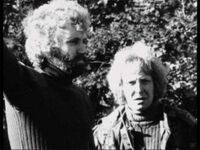Douglas Camfield: Difference between revisions
No edit summary |
No edit summary |
||
| Line 4: | Line 4: | ||
'''Douglas Camfield''' ([[8th May]] [[1931]]-[[27th January]] [[1984]]) was an accomplished [[director]] for [[television]] from the [[1960s]] to the [[1980s]]. In addition to ''[[Doctor Who]]'', his programme credits include ''Z Cars'', ''Paul Temple'', ''Van der Valk'', ''The Sweeney'', ''Shoestring'', ''The Professionals'', and the [[BBC]] dramatisation of ''Beau Geste''. | '''Douglas Camfield''' ([[8th May]] [[1931]]-[[27th January]] [[1984]]) was an accomplished [[director]] for [[television]] from the [[1960s]] to the [[1980s]]. In addition to ''[[Doctor Who]]'', his programme credits include ''Z Cars'', ''Paul Temple'', ''Van der Valk'', ''The Sweeney'', ''Shoestring'', ''The Professionals'', and the [[BBC]] dramatisation of ''Beau Geste''. | ||
He was production assistant on ''Doctor Who'''s earliest serials, ''[[The Pilot Episode]]'', ''[[An Unearthly Child]]'' | He was production assistant on ''Doctor Who'''s earliest serials, ''[[The Pilot Episode]]'', ''[[An Unearthly Child]]'' (in which he directed a fight scene a)nd ''[[Marco Polo (TV story)|Marco Polo]]''. Camfield went on to direct many other stories in the series' first thirteen years: | ||
*''[[Planet of Giants]]'' (Camfield directed half of part 3); | *''[[Planet of Giants]]'' (Camfield directed half of part 3 but got sole credit); | ||
*''[[The Crusade]]'' (possibly the most well realised historical tale of the era) | *''[[The Crusade]]'' (possibly the most well realised historical tale of the era) | ||
*''[[The Time Meddler]]'' (notable for its imaginative use of effects to overcome studio confines); | *''[[The Time Meddler]]'' (notable for its imaginative use of effects to overcome studio confines); | ||
*''[[The Daleks' Master Plan]]'' ( | *''[[The Daleks' Master Plan]]'' (adding a notable visual inventiveness to this 12 part epic); | ||
*''[[The Web of Fear|The Web of Fear ]]''(in which he creates a particularly strong suspenseful atmosphere); | *''[[The Web of Fear|The Web of Fear ]]''(in which he creates a particularly strong suspenseful atmosphere); | ||
*''[[The Invasion]]'' (which became the most expensive ''Doctor Who'' serial up to that time); | *''[[The Invasion]]'' (which became the most expensive ''Doctor Who'' serial up to that time); | ||
*''[[Inferno]]'' (he became ill during the recording of the | *''[[Inferno]]'' (for which he directed all the film work, but became ill due to a heart condition during the recording of the studio scenes, so the remainder were directed by the series' producer, [[Barry Letts]], though Camfield retained sole credit); | ||
*''[[Terror of the Zygons]]''; | *''[[Terror of the Zygons]]''; | ||
*''[[The Seeds of Doom]]''. | *''[[The Seeds of Doom]]''. | ||
Revision as of 06:49, 21 October 2010
Douglas Camfield (8th May 1931-27th January 1984) was an accomplished director for television from the 1960s to the 1980s. In addition to Doctor Who, his programme credits include Z Cars, Paul Temple, Van der Valk, The Sweeney, Shoestring, The Professionals, and the BBC dramatisation of Beau Geste.
He was production assistant on Doctor Who's earliest serials, The Pilot Episode, An Unearthly Child (in which he directed a fight scene a)nd Marco Polo. Camfield went on to direct many other stories in the series' first thirteen years:
- Planet of Giants (Camfield directed half of part 3 but got sole credit);
- The Crusade (possibly the most well realised historical tale of the era)
- The Time Meddler (notable for its imaginative use of effects to overcome studio confines);
- The Daleks' Master Plan (adding a notable visual inventiveness to this 12 part epic);
- The Web of Fear (in which he creates a particularly strong suspenseful atmosphere);
- The Invasion (which became the most expensive Doctor Who serial up to that time);
- Inferno (for which he directed all the film work, but became ill due to a heart condition during the recording of the studio scenes, so the remainder were directed by the series' producer, Barry Letts, though Camfield retained sole credit);
- Terror of the Zygons;
- The Seeds of Doom.
It is reputed that he declined the offer to become producer of Doctor Who in 1969, after the departure of Derrick Sherwin. The job instead went to Barry Letts. He also sought to get Philip Hinchcliffe to commission his script for the programme, which involved aliens, the French Foreign Legion and would have killed off the character of Sarah Jane Smith. However, this story was not produced, and Sarah left the programme quite alive in The Hand of Fear.
Douglas Camfield served as an officer in the British Army during his younger years.
In later life he suffered from a heart ailment, and died of a heart attack. He was married to the actress Sheila Dunn, whom he cast in Inferno as Dr. Petra Williams.

